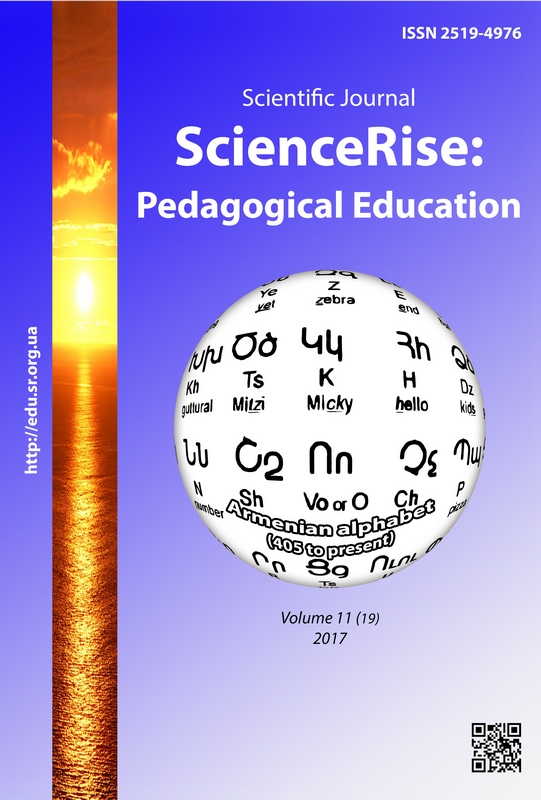Updating content of mathematical education in the new Ukrainian school
DOI:
https://doi.org/10.15587/2519-4984.2017.116474Keywords:
New Ukrainian School, Reform of the Education System, Secondary Education, Competence, Competency Approach, Mathematical Education, Educational Process, Recommendations, Teacher, StudentAbstract
The problem of updating the content of mathematical education in the New Ukrainian school is a part of the problem of updating the education of Ukraine as a whole. Over the past five years, the draft conceptual framework for reforming secondary education has been the subject of discussion among various target audiences, in particular teachers, parents, school principals, representatives of district departments of education and the Ministry of Education and Science of Ukraine. The concept has been refined many times in the light of existing proposals and remarks, but today the entire educational community is working towards introducing these conceptual foundations into the educational process of middle school, and therefore mathematical education must also meet the new requirements that are sufficiently thoroughly and exhaustively covered in project.
The purpose of the article is to reveal the main features of the conceptual foundations of the reform of secondary education «The New Ukrainian School», the realization of which is scheduled for 2016 – 2029, as well as to give recommendations on the adaptation of modern mathematical education to the requirements of the New Ukrainian school, based on its key components.
A set of research methods: general scientific (analysis of scientific, educational and methodical literature, materials of periodicals, normative documentation; synthesis and synthesis of the content of the project «New Ukrainian School»); historical (chronological, retrospective) methods are used to achieve the goal in the process of work.
The results of the study are formulated in the form of recommendations for teachers of mathematics, the introduction of which will be appropriate at the first stage the conceptual framework of implementation (2016 – 2018) of reforming secondary education. In particular, the systematic work of teachers of mathematics on self-education, the development of programs of elective courses, the use of interactive teaching methods, the technological approach to mathematical education, the introduction of a competent approach in the educational process
References
- Robinson, K., Aronyka, L. (2016). Creative Schools: The Grassroots Revolution That’s Transforming Education. New York: Penguin Books, 320.
- Berezivska, L. D. (2017). Proekt yedynoi shkoly v Ukraini pro dvanadtsiatyrichnu zahalnu seredniu osvitu (1917–1920 rr.) [The project of a unified school in Ukraine on twelve year general secondary education (1917 – 1920 years)]. Pedahohika i psykholohiia. Visnyk APN Ukrainy [Pedagogy and psychology. Bulletin of the Academy of Pedagogical Sciences of Ukraine], 1, 77–84.
- Kuz, V. Gh. (2017). Nova ukrainska shkola za kontseptsiieiu rozvytku osvity na period 2015–2025 rr. [New Ukrainian school for the concept of development of education for the period 2015 – 2025 years]. Pedahohika i psykholohiia. Visnyk APN Ukrainy [Pedagogy and psychology. Bulletin of the Academy of Pedagogical Sciences of Ukraine], 1, 21–26.
- Denysenko, О. M. (2017). Mediainformatsiino hramotnyi uchytel yak umova realizatsii kontseptsii «Novoi ukrainskoi shkoly» [Medialiterate teacher as a condition for the implementation of the concept of the «New Ukrainian School»]. Hlobalni vyklyky pedahohichnoi osvity v universytetskomu prostori [Global challenges of teacher education in the university space]. Odessa: Vydavnychyi dim «Helvetyka», 57–58.
- Sesyk, О. О. (2017). Pedahohika partnerstva – kliuchovyi komponent formuly «Novoi shkoly» [Pedagogy of partnership is a key component of the formula «New School»]. Vykhovna robota v shkoli [Educational work in school], 3 (148), 2–4.
- Peniaiev, S., Savusin, M., Manchenko, S. (2017). Kontseptsiia NUSh: chomu varto doopratsiuvaty [The concept of NUSH: why it is worth refinement]. Suchasna shkola Ukrainy [Modern school of Ukraine], 5 (305), 51–58.
- Dolynska, T. H. (2017). Osoblyvosti formuvannia komunikatyvnoi kompetentnosti maibutnikh uchyteliv z pochatkovoi osvity za suchasnykh umov [Features of formation of communicative competence of future teachers from elementary education in modern conditions]. Hlobalni vyklyky pedahohichnoi osvity v universytetskomu prostori [Global challenges of teacher education in the university space: materials of the 3rd international congress]. Odessa: Vydavnychyi dim «Helvetyka», 60–61.
- Kontseptsiia rozvytku osvity Ukrainy na period 2015–2025 rokiv [Concept of development of education of Ukraine for the period of 2015–2025 years] (2014). Ministerstvo osvity i nauky Ukrainy. Available at: http://old.mon.gov.ua/ua/pr-viddil/1312/1390288033/1414672797/
- Kontseptualni zasady reformuvannia serednoi shkoly «Nova ukrainska shkola» [Conceptual Principles of Reforming the Secondary School «New Ukrainian School»] (2016). Ministerstvo osvity i nauky Ukrainy, 34. Available at: http://mon.gov.ua/activity/education/zagalna-serednya/ua-sch-2016/
- Trush, N. I., Besedin, B. B., Biriukova, H. M., Pleskanova, L. H. (2009). Modelyuvannya suchasnogo uroku matematiki v shkolі [Simulation of a modern mathematics lesson in school]. Slov'yansk, 103.
Downloads
Published
How to Cite
Issue
Section
License
Copyright (c) 2017 Tetiana Shulik

This work is licensed under a Creative Commons Attribution 4.0 International License.
Our journal abides by the Creative Commons CC BY copyright rights and permissions for open access journals.
Authors, who are published in this journal, agree to the following conditions:
1. The authors reserve the right to authorship of the work and pass the first publication right of this work to the journal under the terms of a Creative Commons CC BY, which allows others to freely distribute the published research with the obligatory reference to the authors of the original work and the first publication of the work in this journal.
2. The authors have the right to conclude separate supplement agreements that relate to non-exclusive work distribution in the form in which it has been published by the journal (for example, to upload the work to the online storage of the journal or publish it as part of a monograph), provided that the reference to the first publication of the work in this journal is included.








